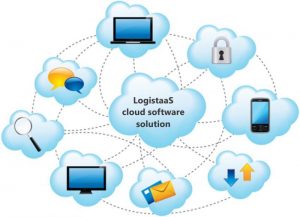LogitaaS : Empowering freight forwarders with cutting edge technology
As the race for increasing competitiveness using more advanced technology became fierce, companies are now realizing that cutting-edge software is becoming more of a necessity than a luxury
The term ‘cloud’ is a word we have all heard before and is also the one technology that will set a trend in the cargo industry in the years to come.
The dawn of freight management software programs have truly given businesses an upper hand in controlling their supply chains and ensuring that shipping and receiving of freight were as efficient as possible, giving them the ability to provide customers with the best possible service.
Combining that with the benefits of cloud-based computing and data management can lead to a powerful business tool that provides for greater success and growth.
According to the latest survey from ‘Logistics Management Technology’ usage study, 18 percent of responding logistics professionals says they have already adopted cloud-based solutions, 37 percent are evaluating them, 13 percent actually do not see cloud-based solutions as an option, and another 26 percent say they not are sure of their company’s interest in cloud computing.
The report “Freight Management System Market by Solution (Freight Tracking & Monitoring, Cargo Routing & Scheduling, Security, EDI, TMS, Order Management), End-user (3PLs, Forwarders, Brokers, Shippers), Transportation Mode, and Region – Global Forecast to 2023,” predicts the cloud software market size to grow from US$10.76 billion in 2018 to $17.45 billion by 2023, at a Compound Annual Growth Rate (CAGR) of 10.1% during the forecast period.
Some of the factors expected to drive the growth of the freight management system market include the need to reduce the transit time, desire for supply chain visibility, higher customer satisfaction, and the low cost of logistics, coupled with the advancements in freight security, safety, and transportation solutions; and rapid growth in communication technologies and IoT. However, congested trade routes and cross-border trade risks and environment concerns related to transportation and logistics may restrain the market growth.
Penetrating freight industry
Cloud-based applications continue to penetrate the supply chain management software space, as more operations are eager to embrace the advantages, which it maintains over traditional options.
In an email interview with Ahmad Abdel-Yaman, Co-Founder and Chief Technology Officer, LogitaaS, Air Cargo Update discussed how its freight management software empowers freight forwarders with its cloud-based technology while integrating with shipping lines and airlines.
LogistaaS is the cloud software solution for medium and small-sized freight forwarders looking to improve their competitiveness through technology and streamline their day-to-day processes. It is user friendly, developed using the most advanced technologies, and integrated with many shipping lines and airlines.
 “LogistaaS is a cloud software for shipping and logistics companies. We aim to provide our clients with a software solution that fits all their needs at a reasonable price. LogistaaS has modules for CRM, sales team management, pricing, shipment management, and invoice management. We also allow managers to have a deep insight on their business and answer thousands of questions with our reports.
“LogistaaS is a cloud software for shipping and logistics companies. We aim to provide our clients with a software solution that fits all their needs at a reasonable price. LogistaaS has modules for CRM, sales team management, pricing, shipment management, and invoice management. We also allow managers to have a deep insight on their business and answer thousands of questions with our reports.
“Our unique combination of features, pricing, customizability, and connectivity sets LogistaaS apart from other solutions and gives our customers more value for their money,” notes Ahmad.
Real time collaboration
LogitaaS uses resources, processes and technology to create solutions that deliver the right goods to the right place at the right time—as quickly and cost effectively as possible. Managers looking for technology to support those solutions may find that cloud computing offers some compelling options.
One of the oft-cited benefits includes cost reduction, as it is a significant factor in most supply chain managers’ decision to move to the cloud.
Outsourcing the maintenance and management of their IT infra-structure and workloads to off-premises data centers provides levels of compliance and high availability that could be costly to implement in their own environment.
Cloud hosting providers also tend to offer support from skilled teams that specialize in keeping IT infrastructure and systems running. Depending on your needs, cloud hosting can help you keep costs down by decreasing your IT spends.
“LogistaaS is built with the latest technologies and is designed to be simple to use, fast, and efficient. This translates into time and cost savings for our clients”.
LogitaaS has made it easier for employees, clients and businesses to collaborate with ease, thus, enhancing connections that are easy and less time-consuming. Collaboration with cloud computing is the same as instant messaging. However, it provides complete, specific tasks that take just hours instead of months to accomplish.
“LogistaaS gives clients many connectivity options, and with those, offers instant updates for any data sent to or received from external sources. Examples of this include instant transmission of financial data to accounting systems, instant updates on bookings and eAWBs, as well as any changes to internal data the user might be interested in,” Ahmad stressed.
Economies of scale
For small and medium-sized enterprises (SMEs), LogitaaS has many advantages – mainly economic ones. As the data and applications are hosted remotely, it does away with the cost and burden of hardware and software acquisition, and maintenance.
Essentially, LogitaaS offers many key advantages for SMEs including flexibility, scalability, easy accessibility, etc.
“By streamlining the company’s workflow, optimizing the use of its resources, and giving management full visibility of how things are progressing in their company, LogistaaS allows SME’s to run more efficiently and securely, which in turn allows them to be more competitive,” explains Ahmad.
LogistaaS also allows different clients to connect with each other internally; this allows them to share shipment data with each other with a simple button click, which gives them many benefits in terms of minimizing errors and time wasted in double data entry.
‘Digital fitness’
A PWC report on the future of the logistics industry predicts that “’digital fitness’ will be a prerequisite for success: The winners will be those that understand how to exploit a whole range of new technologies, from data analytics to automation and platform technologies.”
Freight forwarders are now looking at technology seriously and increasingly to improve operational efficiency, cut down on running costs, and offer the best service to clients.
 “Many logistics companies are used to software being used for simple data entry, we prefer to think of LogistaaS as a more useful tool for employees and managers. All interactions on the system are carefully designed to minimize data entry and errors, and our task management module is highly useful for users to keep track of what needs to be done at any given point in time. Managers also get many tools to give them a big picture of how their business is running and allows them to see areas where they could optimize or improve performance,” says Ahmad.
“Many logistics companies are used to software being used for simple data entry, we prefer to think of LogistaaS as a more useful tool for employees and managers. All interactions on the system are carefully designed to minimize data entry and errors, and our task management module is highly useful for users to keep track of what needs to be done at any given point in time. Managers also get many tools to give them a big picture of how their business is running and allows them to see areas where they could optimize or improve performance,” says Ahmad.
LogistaaS has also a very flexible invoicing system that allows companies to issue invoices for shipments with their own customized templates, manage taxes, and keep track of payments in a simple and easy way.
Operating on a global scale
LogitaaS currently has clients in over 25 countries around the world.
“This means that we need to balance the customization needs of each country and client with the need for a standard and secure software for companies to work with. By maintaining constant communi-cation with our clients and staying updated with the latest industry standards, we feel that we manage to find that balance and cater to the needs of our clients globally,” Ahmad notes.
INTTRA and WinWebConnect are solution providers that facilitate the process of sending booking and eAWB data to carriers. LogistaaS is connected with both and thus allows us to give this flexibility to our clients and allow them to enter all their data in one place and transmit it to multiple parties as needed.
“We are connected with INTTRA, which provides our clients with the ability to send electronic booking requests to over 50 carriers and receive updates on those requests without leaving LogistaaS.”
LogitaaS also provides its clients a customized online portal, which they in turn can give to their customers. Customers then can see updates about their shipments and invoices, upload files, and submit inquiries to their freight forwarder directly from that portal.
As the race for increasing competitiveness using more advanced technology has become fierce, companies are now realizing that cutting-edge software is becoming more of a necessity and less luxury.
“We completely agree with this statement and think that the logistics field has not taken advantage of new technological advancements as much as other fields, which means that there is more room for improvement and growth for those who are willing to embrace development and look at things from a different perspective. We believe that companies that get the right formula can grow faster, more efficiently, and adapt more quickly to the needs of the market, and we believe that LogistaaS is right tool for this,” says Ahmad.
Ahmad concludes his interview with his opinion by saying, “As a major shipping hub in the region, the UAE always had a high traffic and is a pretty demanding market for any logistics company. It is for that reason that we have an office in Dubai, which allows us to have access to market data and to study the needs of our clients. We thus believe that we are the perfect partner for any logistics company in the UAE and that, as we continue to add more advanced features, our clients will also gain an increasing advantage over their competitors.”










